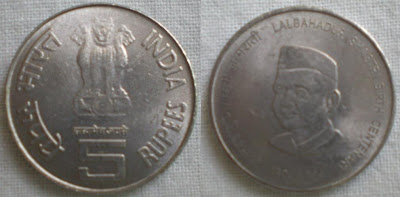Five rupee: SBI(steel)

State Bank of India (SBI) is the largest bank in India.
The bank traces its ancestry back through the Imperial Bank of India to the founding in 1806 of the Bank of Calcutta, making it the oldest commercial bank in the Indian Subcontinent. The Government of India nationalised the Imperial Bank of India in 1955, with the Reserve Bank of India taking a 60% stake, and renamed it the State Bank of India. In 2008, the Government took over the stake held by the Reserve Bank of India.
SBI provides a range of banking products through its vast network in India and overseas, including products aimed at NRIs. The State Bank Group, with over 16000 branches, has the largest branch network in India. With an asset base of $250 billion and $195 billion in deposits, it is a regional banking behemoth. It has a market share among Indian commercial banks of about 20% in deposits and advances, and SBI accounts for almost one-fifth of the nation’s loans.
SBI has tried to reduce its over-staffing through computerizing operations and Golden handshake schemes that led to a flight of its best and brightest managers. These managers took the retirement allowances and then went on the become senior managers at new private sector banks.
The State bank of India is 29th most reputable company in the world according to Forbes.
See also: SBI UNC set
See also: SBI UNC set
Five rupee: ONGC(steel)

Oil and Natural Gas Corporation Limited ( ONGC India) is considered Asia's best Oil & Gas company . It ranks as the 2nd biggest E&P company (and 1st in terms of profits), as per the Platts Energy Business Technology (EBT) Survey 2004. It ranks 24th among Global Energy Companies by Market Capitalization in PFC Energy 50 (December 2004). ONGC was ranked 17th till March 2004, before the shares prices dropped marginally for external reasons.
Activities
Everyone who works at ONGC India is responsible for protecting the environment, health and safety of our people and communities worldwide. Our commitment to SHE performance is an integral part of our business, and achieving cost-effective solution is essential to our long-term success.
The dedication to the causes of environment and safety in ONGC is amply demonstrated by the fact that a separate institute named Institute of Petroleum Safety, Health and Environment Management (IPSHEM) had been set up way back in 1989 to deal with these issues.
Oil and Natural Gas Corporation Limited ONGC 's safety policy seeks to provide safe and healthy working conditions and enlist the active support of all staff in achieving these ends.
The development activities of ONGC has been planned on sound ecological principle and incorporates appropriate environmental safeguards.
See also: ONGC UNC set
See also: ONGC UNC set
Lal Bahadur Shastri was born in 1905 in Prayag. His father Sharada Prasad, a schoolteacher at the local school, passed away when Lal Bahadur was barely a year and a half. Growing up without a father forced Lal Bahadur to accept responsibility at an early age. He was sent by his uncle to Varanasi to pursue his studies.
After a short stay with a family that treated him unkindly, Lal Bahadur stayed with a teacher, Mishraji. Mishraji often sat and told stories about how India lost her freedom to the British to young Lal Bahadur. These conversations later inspired Lal Bahadur to join the struggle for Indian freedom
At about this time Gandhiji came to Varanasi and spoke of his non-cooperation movement. Lal Bahadur took a keen interest in the growing movement and when the time came to boycott the schools, he did so by not appearing for his examinations. With just one year left for his graduation, the news was not taken well at home. Neither his Uncle nor Mishraji supported Lal Bahadur’s action, but his mother who had complete faith in him, supported his decision as long as he promised not to renege from the task later. With his mother’s blessings, he became fully involved in the non-cooperation movement. He was arrested for taking part in banned processions but released since it was his first offense. This was to be the first of many arrests for Lal Bahadur. He worked during the evenings in a khadi shop and studied while studying for the degree of Shastri (Bachelor) in Philosophy. Lal Bahadur graduated at the head of his class.
His total commitment to Gandhiji and the non-cooperation movement resulted in many jail terms. Since the Congress party was banned by the British Government, Lal Bahadur and his associates spent their time travelling around India spreading Gandhiji’s message. He was soon arrested for these activities, and jailed for seven months at an unknown location. Eighteen months later Lalita Devi was granted permission to meet her husband
Lal Bahadur was finally released from prison in 1946. On August 15, 1947 India gained independence. Lal Bahadur was appointed Minister of Police in Nehru’s cabinet. In 1951 Jawaharlal Nehru was re-elected Prime Minister for a second term, and Lal Bahadur was appointed General Secretary of the Lok Sabha. While in Nehru’s cabinet, Lal Bahadur was entrusted with portfolios for Minister of Railways, Minister of Communications and later Home Minister. He served as Nehru’s right hand. On May 27, 1964 Pandit Jawaharlal Nehru died. May of that year Lal Bahadur Shastri became India’s second Prime Minister. His term is best known for introducing measures to make India self-sufficient in food production.
In 1965 Pakistan attacked India on the Kashmiri front and Lal Bahadur Shastri responded in kind by punching toward Lahore. In 1966 a cease-fire was issued as a result of international pressure. Lal Bahadur Shastri went to Tashkent to hold talks with Ayub Khan and an agreement was soon signed.
Lal Bahadur passed away in Tashkent before returning home. He was posthumously conferred with the Bharat Ratna Award.


No comments:
Post a Comment